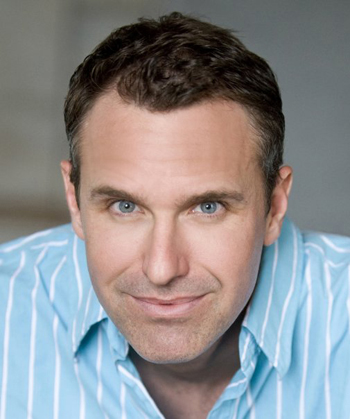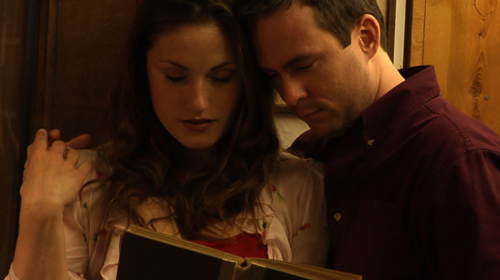…OR HOW TO MAKE MOVIES AGAINST-ALL-ODDS
WITHOUT THE ADDED DISTRACTION OF
GETTING PAID FOR IT

DAVE ASH WRITER/DIRECTOR/EDITOR
“No, no, no, no, no … stop talking. Give me the shot. Tell me your film in one sentence,” the producer interrupted.
Up until that moment, I was roughly thirty seconds into an elaborate exegesis of the multiple reflecting layers of subtle psychological resonance and sociological importance inherent in my first feature film script, YOU’RE THE ONE. Fifteen seconds prior to that, I was standing behind the producer and holding a pretend conversation with the side of another pathetic screenwriter’s head in order to not seem like I was very creepily stalking the producer, which I was.

The scene was a “Producer’s Cocktail Party” at a 2004 screenwriting event in Los Angeles and was thrown by the organization in order to give starry-eyed dreamers like myself the opportunity to pay $100 to be crushed and humiliated by actual, real-life Hollywood big-shots. YOU’RE THE ONE had actually placed in the top 1% of entries in the event’s script competition that year, so they offered to pay my admission to the three-day event. All I had to do was find a way to remove myself for a few days from cold and depressing Minnesota for my long overdue moment in the sun.
On the flight in, I quaffed several cold pilsners and tried to map out how I was going to tell my family that it was now obvious that my destiny was not to crunch numbers all day the rest of my life in a beige-ish gray cubicle in St. Paul, but rather to create movie magic in Southern California with really hot people.
However, by the third day of the screenwriting event, after attending many eye-opening seminars on the business of Hollywood, as well as paying for and taking part in several “Pitch Sessions” along with over a thousand other aspiring screenwriters (invariably attended on the buy side by whichever beautiful and coolly detached 20-something intern at William Morris Agency drew the short straw that day), it started to dawn on me that it was possible there might not be a high-stakes bidding war over production rights to my 125-page meditation on the interior life of a depressed accountant.

However, while wading in circles in the middle of this Darwinian cesspool, gripping my $15 Jack and Coke like a life raft (this was before we could pretend to look at our smart phones in self-conscious moments), the cognitive dissonance I had progressively experienced during my three-day Hollywood sojourn moved from my head to a much more real, gut level feeling—you don’t belong here.
Unfortunately, the part of my psyche that had long harbored the make-it-in-Hollywood dream wasn’t quite ready to give up that easily. So, like an incredibly insecure shark circling a tan and shiny piece of meat, I slowly elbowed my way through the screenwriting detritus to the aforementioned Big Shot Producer. After patiently waiting my turn for the latest gushing moron to be dismissed, I moved in and began the tight five-minute pitch I had been rehearsing in my head all week.

I don’t know if it was the bored and dismissive way she abruptly stopped me on my second deep breath, or the profound stupidity of the whole scene in general, or just the accumulated effect of spending three days on the factory floor seeing how the sausage is made—the joyless, unrelenting, methodical, grinding of art into perfect casings of commerce—but in that moment something gave and I just couldn’t do it anymore.
“It’s THE PASSION OF CHRIST meets RIVERDANCE,” I said without missing a beat.
When I saw the disgusted look on her face, I knew it was time to leave Los Angeles.
On the overnight flight home, I realized that I had two options going forward: 1) continue to write and send screenplays to Hollywood producers so they can use them to make paper mache donkey piñatas for their children’s birthday parties, or 2) learn how to make my own films. I chose the latter.
So, for the next six months, I took every night class on filmmaking available at the Minnesota IFP so I would never again have to be at the mercy of Hollywood development people that are primarily interested in investing in films that are sequels, or prequels, or a re-make, or based on a popular book, TV show, or comic book, or a re-make of a sequel to a video game TV show based on a comic book.
After learning more about the craft of filmmaking, I wrote and directed five short films, the feature film, LOVE: A DOCUMENTARY, and then, most recently, my new feature film, CONNECTED (coming soon!). The financial windfall from these endeavors has been underwhelming, but I’ve had a blast making these films so far, and have been paid back enormously by the relationships I’ve developed with many insanely talented and generous actors, crew, and producers in the very fertile and collaborative artistic community here in the Twin Cities.
With each film, I’ve learned more about the art and science of filmmaking, as well as the indie movie business, that I did not learn initially in all of the film classes and all of the books I had read on these subjects. Filmmaking is a very subjective process, so it’s the ultimate must-learn-by-doing discipline. So, each filmmaker has their own way of making films, and, correspondingly, their own set of lessons they’ve learned along the way.
In addition to sharing my story, the editors at filmcourage.com have also asked me to share a few of my own hard-earned lessons, so here goes:
Understand the parameters of your production budget before starting your script. Not doing this is the most common mistake I see among filmmakers and why the majority of DIY independent feature films are never completed. We grow up watching studio films and this is our vocabulary, so it’s hard for new filmmakers to write a script that doesn’t include special effects, gratuitous violence, and petroleum cargo driving off a cliff and then exploding on impact, killing the bad guy really good. The problem, of course, comes when you’ve spent a year writing your story around this kind of stuff and then can’t fund the production on the $5K you scraped together on kickstarter. For my first film, LOVE: A DOCUMENTARY, I knew we wouldn’t have much of any funding for production or location fees, so I wrote a script that could be shot quickly and entirely at one multi-use location that we could access for free. So, we were able to make a feature length film that has screened at a few festivals for a total production budget of about a thousand dollars.
Hire actors whose natural personality and background is similar to their character. Further cost savings here, without sacrificing quality (often improving it). You can run a lot of auditions with expensive unionized professional actresses, or hold out for months/years for an even more expensive big name actress willing to slum and “go indie” for some street cred by playing your rough and raw foul-mouthed dyslexic hooker with a heart of gold. Or, you can just hire a hooker. In my experience, I’ve invariably been more satisfied with performances when I’ve hired less-experienced, less recognizable actors that already look and sound the part, rather than asking more polished (and expensive) actors to act outside of their natural character. Also, am I the only one that feels that well-known stars actually distract from your involvement in a film’s story? A filmmaker spends a tremendous amount of time, effort, and money getting the set, lighting, and dialogue just right in order to draw the audience in through the gritty real-life verisimilitude of a scene and then you watch it and it’s, hey – that cop is Matt Damon.
How much you enjoy production will depend entirely on who you hire. Obviously, it’s important that actors and crew are good at what they do, but you also have to realize that only about 2% of the time you spend with these people will be while the camera is rolling. For the other 98% of the time, you will be milling around between takes patiently waiting for the set to be prepared while mocking other cast and crew that do not happen to be on set that day. So, 98% of your time on the film could easily be miserable if you only hire people based exclusively on how good they are at their jobs.

Similarly, do not let it get you down when the major film festivals summarily reject your film. Film selections at the top-tier festivals are more rigged than a North Korean election. This fact is now widely accepted in the indie film community. According to a friend that has worked on selection committees for many of the top festivals for over ten years, the “A-tier” festivals have selected exactly zero, none, nada, (0), cold submissions in the last several years. So, unless Leo DiCaprio is in your movie or you know someone very well on the inside, hold off on the flight reservations for Park City, UT. Although you may imagine your film festival submission being fervently debated by “Mr. Distinguished” and company in a majestic ski-lodge over cigars and brandy, your life’s work will be judged by a 20 year-old film school sophomore that is pursuing the cinematic arts because he thought SAW III was “beast” and who will spark a fatty before viewing your film and disdainfully click it off after eight minutes if he hasn’t yet seen a boob, Mila Kunis, marauding aliens, or some combination therein.
Inconvenient Truth #1: You will need to incessantly bug the shit out of people to get anywhere with your completed film. Unlike other industries where people rely on “resumés” and “quality of work” when considering working with you, the film industry operates primarily within what I would call a “name-ocracy”. Everyone in the film industry keeps a mental list of the people they know of in the industry and, starting with like Steven Spielberg on down, is continually re-ranking these names based on their perceived power and influence. Thus, they will give you exactly the time and attention warranted by their perceived position of themselves on this list of relative to you. If the person you’re contacting is way below you on this list, they will move mountains to work on or promote your project, even if they know it sucks. However, if the roles are reversed you could send them the modern-day CITIZEN KANE and they will use it as a paperweight. It’s a metric that never fails, and explains a lot about what happens in the film world, such as the perpetual release of sh*tty new Adam Sandler movies. So, your only hope when trying to advance the cause of your film by contacting the bigger players in the industry is to annoy them to the point where it becomes easier for them to just deal with you directly than to have to continue to read and then delete your pathetic emails. Or, if you happen on a big shot that still has a heart left, your other hope is that they will eventually respond to you out of basic human pity (assuming they do not issue a restraining order). Either way you win. Welcome to the jungle.
Inconvenient Truth #2: The end of your artistic journey will not involve taking conference calls with (insert name of famous Hollywood producer) while being fellated by movie starlets. Just a heads up.
Inconvenient Truth #3: It’s potentially possible that you will not make a lot of money as a filmmaker. The odds are better that you will be struck by lightening while driving to pick up a check for winning the Powerball made out to you and your new wife, Miss Universe.
CONNECTED trailer:
Interview on the making of LOVE: A DOCUMENTARY, Pt. 1:
Interview on the making of LOVE: A DOCUMENTARY, Pt. 2:
BIO:
Prior to CONNECTED, Dave Ash wrote, directed, and edited five short films that have played at a variety of local, national, and international film festivals, as well as the feature film, LOVE: A DOCUMENTARY. In 2009, LOVE won the Indie Fest Feature Film Merit Award and was named the #2 Minnesota film event of the year by MNartists.org. Ash’s short films, as well as his pre-filmmaking satirical writing for publications such as McSweeney’s, can be found at Daveashinc.com.
























